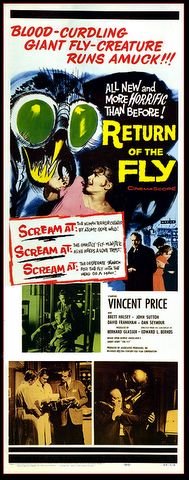John Peel left his coveted collection of more than 25,000 records to his wife in his will, it emerged last night. Sheila Ravenscroft will also receive the legendary Radio 1 DJ's estate, valued at more than £1.5m.
Ravenscroft was granted the 25,000 vinyl albums and thousands of CDs after Peel, who died in October 2004, failed to specifically assign them in his will. In typically laid-back fashion, he said: "I ask her (but without imposing any binding obligation) to give effect to any wishes of mine which may come to her attention as to their disposal."
Peel's four children were left more than £250,000 in trust to be split between them. Peel enjoyed national acclaim in a career that spanned over 40 years and included Radio 4.
More John Peel from the BBC.
One of John’s many favourite bands, The Undertones, performing one of John’s favourite songs, “Teenage Kicks”:
Here’s the band in 2005 with a different singer.
Tuesday, October 24, 2006
John Peel's Record Collection
Sunday, October 22, 2006
Decoding the Cryptic Region of Mars
In the 1970s, orbiter missions around Mars revealed that during southern spring, large areas near Mars's south pole became much darker than the rest of the seasonal ice cap. How could this area be in the polar region and not be covered in bright ice? Intrigued, planetary scientists called the area the 'cryptic region' of the south seasonal cap.
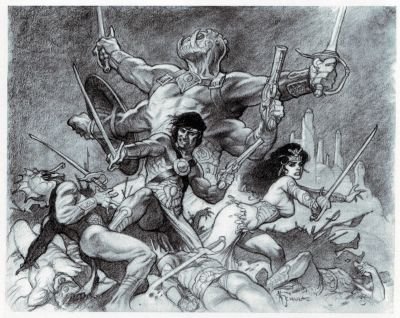
Art © Mark Schultz and available now in his new book “Various Drawings Vol. 2” from Flesk Publications HERE.
The mystery deepened in the late 1990s when new observations showed that the temperature of the cryptic region was close to -135º C. At that temperature, carbon dioxide ice had to be present. So, scientists developed the idea that a one-metre-thick slab of clear carbon dioxide ice covered the cryptic region, allowing the dark surface underneath to be seen.
However, the new observations from Mars Express's OMEGA instrument show that this interpretation cannot be correct. The only way to reconcile the apparently conflicting observations is that there is indeed a thick slab of dry ice in this area, but its surface is so heavily covered by dust that few of the Sun’s rays make it to the deeper layers and back again.
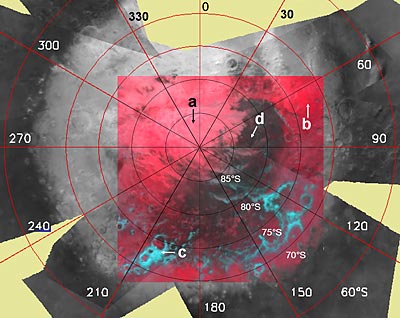
How does the dust get on top of the slab? The answer could be provided by the mysterious markings that dot the cryptic region. Known as spots, 'spiders' and 'fans' depending upon their shapes, they were discovered in 1998–1999 by NASA's Mars Global Surveyor. Planetary scientists that sunlight heating the soil causes carbon dioxide bubbles below the ice to erupt as geysers erupts throwing dust onto the surface creating the fans.
Mars is an Icehouse (no frozen zombies though...):

Art © Mark Schultz and available now in his new book “Various Drawings Vol. 2” from Flesk Publications HERE.
The mystery deepened in the late 1990s when new observations showed that the temperature of the cryptic region was close to -135º C. At that temperature, carbon dioxide ice had to be present. So, scientists developed the idea that a one-metre-thick slab of clear carbon dioxide ice covered the cryptic region, allowing the dark surface underneath to be seen.
However, the new observations from Mars Express's OMEGA instrument show that this interpretation cannot be correct. The only way to reconcile the apparently conflicting observations is that there is indeed a thick slab of dry ice in this area, but its surface is so heavily covered by dust that few of the Sun’s rays make it to the deeper layers and back again.

How does the dust get on top of the slab? The answer could be provided by the mysterious markings that dot the cryptic region. Known as spots, 'spiders' and 'fans' depending upon their shapes, they were discovered in 1998–1999 by NASA's Mars Global Surveyor. Planetary scientists that sunlight heating the soil causes carbon dioxide bubbles below the ice to erupt as geysers erupts throwing dust onto the surface creating the fans.
LINKNo signature of clear CO2 ice from the 'cryptic' regions in Mars' south seasonal polar cap. 2006. Y.Langevin et al. Nature 442: 790-792.
Mars is an Icehouse (no frozen zombies though...):
Friday, October 20, 2006
Time, Space, & Pink Floyd

From the same issue of Folk & Rock that gave us this post on Syd Barrett comes this history of Pink Floyd from 1967-1977. Click each page to enlarge and read.





David Gilmour and Richard wright perform a nice version of "Arnold Layne" live on UK television, 27th May 2006:
Thursday, October 19, 2006
Ciné Live


I pulled these from the latest issue of Ciné Live on the stands here in Canada. Besides the cover feature
 on the new James Bond film there is a long article on the Japanese animation studio Ghibli with lots of artwork from their films such as Nausicaä se la Vallé du Vent, a look at the future of Star Trek, lots of reviews of films that will never make it to NA, a double sided, pull-out poster for Nausicaä se la Vallé du Vent and Casino Royale, plus a free QT DVD with interviews, movie promos, etc. All for $5.50 CND.
on the new James Bond film there is a long article on the Japanese animation studio Ghibli with lots of artwork from their films such as Nausicaä se la Vallé du Vent, a look at the future of Star Trek, lots of reviews of films that will never make it to NA, a double sided, pull-out poster for Nausicaä se la Vallé du Vent and Casino Royale, plus a free QT DVD with interviews, movie promos, etc. All for $5.50 CND.
Sunday, October 8, 2006
Gassing The Delphic Oracle
From ScienceNow:
The Oracle at Delphi in central Greece was a major religious center for more than 1000 years. Citizens and rulers alike made pilgrimages there to get advice on everything from mistresses to military conquests. The officiant at the oracle was always a woman (the Pythia) who perched on a tripod above a chasm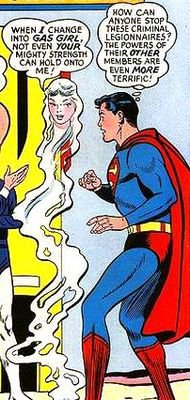 in the bowels of the Temple of Apollo and inhaled fumes from the earth that would induce a prophetic, often crazed, trance during which she would relay the wisdom of the gods.
in the bowels of the Temple of Apollo and inhaled fumes from the earth that would induce a prophetic, often crazed, trance during which she would relay the wisdom of the gods.
The story was dismissed as a myth during the first half of the 20th century. But in the late 1990s a geologist found traces of ethylene, a central-nervous stimulant that can produce euphoria, in a local spring and concluded it was the likely source of the oracle's frenzied trances (image below).
Giuseppe Etiope of the National Institute of Geophysics and Volcanology in Rome asserts that the marine limestones underlying the temple couldn't have contained ethylene in high enough concentrations to account for the trances. The team brought a portable laser sensor to Delphi and discovered no traces of ethylene. Other lab work turned up significant amounts of carbon dioxide and methane seeping from the ground suggesting these gases caused oxygen deprivation in the enclosed temple chamber that was the source of the Pythias' inspiration.
Link: The geological links of the ancient Delphic Oracle (Greece): A reappraisal of natural gas occurrence and origin.
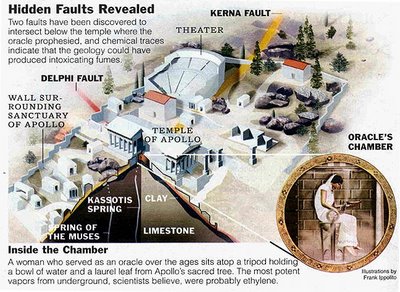
The Oracle at Delphi in central Greece was a major religious center for more than 1000 years. Citizens and rulers alike made pilgrimages there to get advice on everything from mistresses to military conquests. The officiant at the oracle was always a woman (the Pythia) who perched on a tripod above a chasm
 in the bowels of the Temple of Apollo and inhaled fumes from the earth that would induce a prophetic, often crazed, trance during which she would relay the wisdom of the gods.
in the bowels of the Temple of Apollo and inhaled fumes from the earth that would induce a prophetic, often crazed, trance during which she would relay the wisdom of the gods.The story was dismissed as a myth during the first half of the 20th century. But in the late 1990s a geologist found traces of ethylene, a central-nervous stimulant that can produce euphoria, in a local spring and concluded it was the likely source of the oracle's frenzied trances (image below).
Giuseppe Etiope of the National Institute of Geophysics and Volcanology in Rome asserts that the marine limestones underlying the temple couldn't have contained ethylene in high enough concentrations to account for the trances. The team brought a portable laser sensor to Delphi and discovered no traces of ethylene. Other lab work turned up significant amounts of carbon dioxide and methane seeping from the ground suggesting these gases caused oxygen deprivation in the enclosed temple chamber that was the source of the Pythias' inspiration.
Link: The geological links of the ancient Delphic Oracle (Greece): A reappraisal of natural gas occurrence and origin.

In the time of Oracles....:
Friday, October 6, 2006
Herb Tarlek Conquers The Universe!

From The Rheostatics website:
The music video for "The Tarleks" won a Gold Award for Music Video Production at the 2005 Worldfest-Huston Awards. Director Justin Stephenson, reduced to uttering a simple "Cool,"is justly proud of the award.
Frank Bonner appears as his character, Herb Tarlek, from the sit-com WKRP in Cincinatti that ran from 1978 to 1982. Mr. Bonner apparently gets similar requests all the time and, for the most part, refuses but when he played the Rheos' track for friends, their enthusiastic response encouraged him to join in the fun. Tarlek, the station's sleazy salesman, was renowned for impossibly ugly suits, matching white leather belt and shoes, and his relentless efforts to bed Loni Anderson's character Jennifer.

The Rheostatics have released eleven albums since 1987 -- only one a major label release, which speaks to their independent spirit, tenacity and mutual, though not unchallenged, commitment. Inspired by such national treasures as the Group of Seven, Stompin' Tom Connors, the divinatory -- not divine -- government of Mackenzie King, rolling prairies, Canada's national game, les couriers du bois and more, the Rheos have plundered the Canadian mythos to become a kind of bedrock myth themselves.
"People have painted us as being iconoclasts although, more often than not lately, I hear us described as Canadian icons. I think it's great to be iconoclastic icons." - Dave Bidini, Rheostatics guitarist.
Transforming the Architecture of Compound Eyes
Biologists have discovered that the presence of a key protein in the compound eyes of the fruit fly (which glow at their center due to a fluorescent protein) allows the formation of distinct light gathering units in each of its 800 unit eyes, an evolutionary change to an “open system” that enabled insects to make significant improvements in visual acuity and angular sensitivity. In contrast, beetles, bees and many mosquito species have the light-gathering units fused together into a “closed system.”
In a paper published in this week's early online edition of the journal Nature, the scientists report that one of three proteins needed to form these light gathering units is present in the visual system of fruit flies, house flies and other insects with open eye systems, but conspicuously absent in beetles, bees and other species with closed systems. The researchers showed that the loss of this protein, called “spacemaker,” can convert the eyes of fruitflies—which normally have open eye systems—into a closed one. In contrast, the introduction of spacemaker into eyes with a closed system transformed them into an open one.
In a paper published in this week's early online edition of the journal Nature, the scientists report that one of three proteins needed to form these light gathering units is present in the visual system of fruit flies, house flies and other insects with open eye systems, but conspicuously absent in beetles, bees and other species with closed systems. The researchers showed that the loss of this protein, called “spacemaker,” can convert the eyes of fruitflies—which normally have open eye systems—into a closed one. In contrast, the introduction of spacemaker into eyes with a closed system transformed them into an open one.
Subscribe to:
Comments (Atom)


